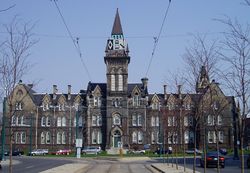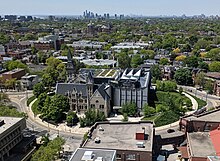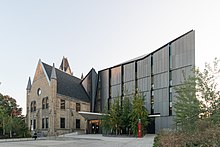1 Spadina Crescent


1 Spadina Crescent, also known as the Daniels Building, is an academic building that houses the John H. Daniels Faculty of Architecture, Landscape, and Design at the University of Toronto (U of T) in Toronto, Ontario, Canada. The building is situated in the centre of a roundabout of Spadina Avenue, north of College Street. Its location provides a picturesque vista looking north up Spadina Avenue; it is an axial view terminus for Spadina Avenue.
History
[edit]

The parcel of land now known as Spadina Crescent first appeared on maps of Toronto as early as 1835, originally named Mansfield's Old Gardens[1] and then Crescent Garden.[2] The property was originally laid out by Dr. William Baldwin to cut through his family's land holdings.[3] There was an intention for the city to turn this property into a park after Dr. Baldwin's death, but the conditions for this were never met, and his grandchildren sold the land in 1873 to the Hon. J. McMurrich of the Presbyterian Church for $10,000.[2]
A Gothic Revival building designed by architect James Avon Smith was built in 1875[4] as the home of Knox College, a theological college of the Presbyterian Church in Canada. Knox College became affiliated with the University of Toronto in 1887, and it moved to its current location on the west side of King's College Circle in 1914.
During World War I, the building became barracks, and shortly afterward became the Spadina Military Hospital in October 1916.[4] For a period in 1918, Amelia Earhart worked as a nurse's aide at the hospital. It remained a veterans' hospital until 1943, when it was acquired by the University of Toronto's Connaught Medical Research Laboratories, which became one of Canada's main centers for the development and manufacture of pharmaceuticals. The building was in disrepair at this point and needed substantial renovations. It was also around this time that the basement was excavated.[5]
During the 1960s, it was proposed that this building be demolished to make way for the Spadina Expressway, which was never built. It became an academic building again in 1972 with the sale and relocation of the laboratories. The building was home to the Ontario division of the Eye Bank of Canada and to an alternative U of T student weekly newspaper, The Newspaper, which moved because of renovations.
In January 2001, University of Toronto professor David Buller was murdered in his office within the building, and the case remains unsolved.[6]
In June 2013, U of T announced a significant overhaul and renovation of the building, with plans to make it the new home for the Daniels Faculty of Architecture.[7] On December 4, 2015, the Toronto Star published a video by Christopher Hume, its architecture critic, celebrating the building's history and the university's plan to renovate, update and expand the building.[8] The building was subsequently restored and renovated by a team of architects – including heritage architects ERA, as well as design architects Nader Tehrani and Katherine Faulkner of the Boston-based firm NADAAA. The expansion, which was completed in 2017, included a new contemporary glass, concrete and steel addition to the north side.[9][10]
The expanded portion of the building now offers space for design studios, lounges, a student cafe, workshops and fabrication labs. The historic building was sensitively restored and renovated to accommodate the new library, classes and faculty offices.[10] Toronto-based landscape architecture studio PUBLIC WORK designed the surrounding landscape, which includes native plants and trees such as birch and oak.[10] On the north side are two large berms, a grassy area and a stepped pathway that leads to the fabrication laboratory.[11] The extensive project received several awards for architectural excellence and was published in magazines around the world.
Interiors
[edit]Main Hall
[edit]
Formerly the site of the Knox College courtyard, The Main Hall is a double-height lecture hall with bleacher-style seating for lectures, performances, and events of up to 400 people.[10] The hall is at the heart of building, accessible via both the historic part of the building at the south side, and via the new east-west internal "street"/corridor in the new building. In 2018, the hall hosted Pritzker Architecture Prize winner Balkrishna Doshi's public lecture about his work and the prize.[12] The hall is adorned with colourful painted plywood walls that add a sense of energy and movement to the space.[11] Above, "a triangular section of stepped seating, like an open stair outside the volume between the second and third floors, overlooks the hall and simultaneously connects to the design studio for graduate students at the top.[10]"
Graduate Design Studio
[edit]
The third-floor graduate design studio is known for its expansive "column-free" space that extends across the entire North side of the building and offers views of the city through a glazed curtain wall.[11] NADAAA architects used gypsum boards to design a dramatic "bow-tie" ceiling made of four scissor trusses and clerestory ceiling openings that bring in natural light. Architect Nader Tehrani was inspired by the Firth of Forth Bridge in Scotland.[10]
Fabrication Lab
[edit]The fabrication lab is a double-height workshop and digital laboratory[13] which "offers a variety of computationally controlled technologies, including large 3-axis and 4-axis routers, a fused deposition modelling rapid-prototyping system, a waterjet cutter, a colour 3D printer, a 3D digitizer, a 3D laser scanner, several laser cutters, and a large format vacuum former.[14]" The array of digital tools allow students at the faculty to produce models and various structural elements in wood and metals.[15] The lab is viewable to students and visitors at the building from the east-west "street" that runs through the centre of the building. Double-height garage style doors open to a landscaped courtyard.[15] Adjacent to the lab is the Daniels construction workshop which includes a full metal and woodworking shop, an assembly space, spray booth, and a large array of materials and tools.[14]
Eberhard Zeidler Library
[edit]
The Eberhard Zeidler Library is located in the historic part of the building, on the west side of the first floor. The library is named after architect and Zeidler Partnership founder Eberhard Zeidler.[16] The library offers an extensive collection of books on architecture, landscape architecture, art, and urban design.[17]
Architecture and Design Gallery
[edit]The Architecture and Design Gallery is an experimental public gallery dedicated to showcasing and advocating for the important ways that design shapes our cities, landscapes, and daily lives. Located in the lower level of the building, it was renovated from a "concrete shell" into a 7,500 s.f. exhibition venue after the new building opened in 2017.[18] The space launched on November 9, 2019, with the opening of the inaugural installation New Circadia.[19] The gallery is supported by the Estate of James Drewry Stewart and the Government of Canada[20].
-
Level 1 The Student Commons
-
Building stair
-
Level 2 corridor
-
Eberhard Zeidler Library interior
Awards
[edit]Architecture Masterprize Education Award, 2019
Architecture Masterprize Green Award, 2019
Architectural Conservancy Ontario, Paul Oberman Award for Adaptive Re-use, 2019
Toronto Urban Design Awards, Award of Excellence, 2019
Heritage Toronto Awards, William Greer Built Heritage Award, 2019
SCUP/AIA-CAE Excellence in Architecture for Building Additions or Adaptive Reuse Honor Award, 2019
COTE Top 10, American Institute of Architects, 2019
AIA Education Facilities National Award of Excellence, 2019
Canadian Society of Landscape Architects National Award, 2019
Lt. Governor's Ontario Heritage Award of Excellence in Conservation, 2018
American Architecture Award, Chicago Athenaeum, 2018
Illinois Institute of Technology College of Architecture, Mies Crown Hall Americas Prize Outstanding Project, 2018
Fast Company Spaces, Places, and Cities Finalist, 2018
Boston Society of Architects Honor Award, 2018
Architect's Newspaper Best of Design Awards Winner in Educational Category and Honorable Mention for Building of the Year, 2018
AIA New York, Architecture Honor Award, 2018
Interior Design Best of Year Award, 2017
The Plan Awards, Honorable Mention, 2017
Canadian Institute of Steel Construction Awards, Award of Excellence, 2017
Society of American Registered Architects National Architecture Award, 2015
Chicago Athenaeum: Museum of Architecture & Design: Green Good Design Award, 2014
Holcim Foundation - Sustainability in Architecture Acknowledgment Prize, 2014
Boston Society of Architects: Unbuilt Architecture Award, 2013
57th Progressive Architecture Awards: Award, Architecture (previous site), 2010
References
[edit]- ^ McHugh, Patricia (1989) [1985]. Toronto Architecture – A City Guide. McClelland & Stewart Inc. The Canadian Publishers. p. 119.
- ^ a b Arthur, Eric (1968) [1964]. Toronto – No Mean City. University of Toronto Press. p. 153. ISBN 9781487516710.
- ^ Bozikovic, Alex (May 5, 2017). "Merging the past with the future". The Globe and Mail.
- ^ a b Bradbury, Jamie. "A Short History of One Spadina Crescent". Torontoist.
- ^ Structures, Show #9 , "1 Spadina Crescent. Rogers Television. 2003.
- ^ "An argument and a thud. How did no one notice the murder of popular U of T art professor David Buller?". thestar.com. March 14, 2021.
- ^ "In pictures: Turning 1 Spadina Cres. into a playground of urban ideas". The Globe and Mail. 2013-06-11. Archived from the original on 2016-08-28. Retrieved 2019-06-11.
- ^
Christoper Hume (2015-12-04). "The big change coming to Spadina and College: Hume". Toronto Star. Archived from the original on 2015-12-06. Retrieved 2015-12-06.
Christopher Hume on the best reason to come to Spadina Ave. and College St. in 2016.
- ^ "New Daniels Building at One Spadina Crescent". John H. Daniels Faculty of Architecture, Landscape, and Design. Archived from the original on 2018-03-15.
- ^ a b c d e f "Daniels Building by NADAAA". www.architecturalrecord.com. Retrieved 2020-04-20.
- ^ a b c "NADAAA fuses old and new to create Daniels Building in Toronto". Dezeen. 2019-05-17. Retrieved 2020-04-20.
- ^ "Architecture's Pritzker Prize winner Balkrishna Doshi puts the focus on people". Retrieved 2020-04-20.
- ^ LafargeHolcim Foundation, LafargeHolcim Foundation for Sustainable Construction. "A showcase for Toronto and sustainable urbanization". LafargeHolcim Foundation website. Retrieved 2020-04-20.
- ^ a b "Technology". Daniels. 2016-07-04. Retrieved 2020-04-20.
- ^ a b "Collaborative architecture: Daniels Building, University of Toronto by NADAAA - DesignCurial". www.designcurial.com. Retrieved 2020-04-20.
- ^ "UofT Daniels Faculty Re-Introduces Toronto to Spadina Crescent | UrbanToronto". urbantoronto.ca. Retrieved 2020-04-20.
- ^ "U of T celebrates the opening of One Spadina Crescent". University of Toronto News. Retrieved 2020-04-20.
- ^ "New Circadia". Canadian Architect. 2020-04-01. Retrieved 2020-04-20.
- ^ "Daniels Faculty Introduces New Experimental Gallery". Canadian Architect. 2019-10-24. Retrieved 2020-04-20.
- ^ "Architecture and Design Gallery". Daniels. 2016-07-04. Retrieved 2020-04-20.
External links
[edit] Media related to 1 Spadina Crescent at Wikimedia Commons
Media related to 1 Spadina Crescent at Wikimedia Commons





